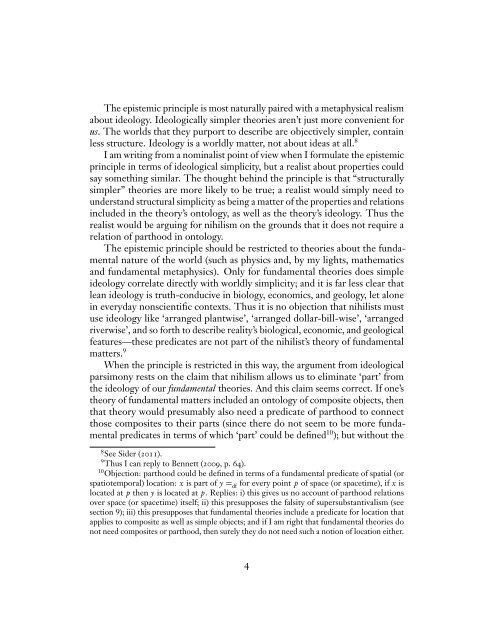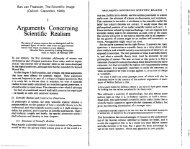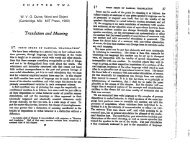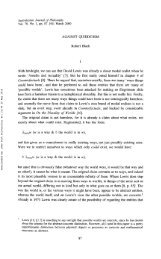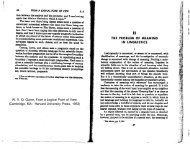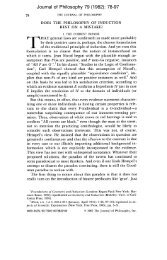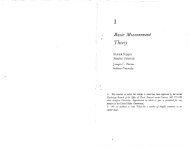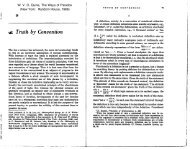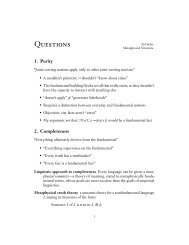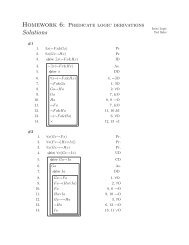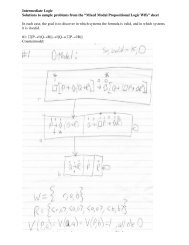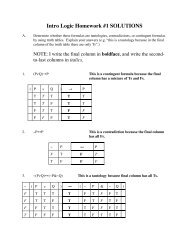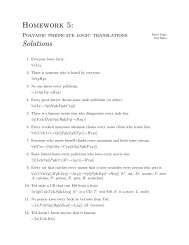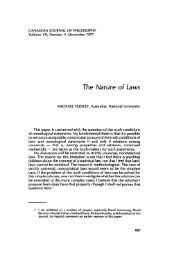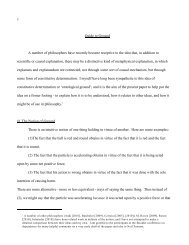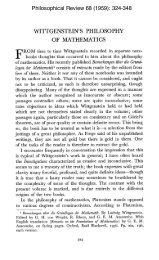Against Parthood∗ - Ted Sider
Against Parthood∗ - Ted Sider
Against Parthood∗ - Ted Sider
You also want an ePaper? Increase the reach of your titles
YUMPU automatically turns print PDFs into web optimized ePapers that Google loves.
The epistemic principle is most naturally paired with a metaphysical realism<br />
about ideology. Ideologically simpler theories aren’t just more convenient for<br />
us. The worlds that they purport to describe are objectively simpler, contain<br />
less structure. Ideology is a worldly matter, not about ideas at all. 8<br />
I am writing from a nominalist point of view when I formulate the epistemic<br />
principle in terms of ideological simplicity, but a realist about properties could<br />
say something similar. The thought behind the principle is that “structurally<br />
simpler” theories are more likely to be true; a realist would simply need to<br />
understand structural simplicity as being a matter of the properties and relations<br />
included in the theory’s ontology, as well as the theory’s ideology. Thus the<br />
realist would be arguing for nihilism on the grounds that it does not require a<br />
relation of parthood in ontology.<br />
The epistemic principle should be restricted to theories about the fundamental<br />
nature of the world (such as physics and, by my lights, mathematics<br />
and fundamental metaphysics). Only for fundamental theories does simple<br />
ideology correlate directly with worldly simplicity; and it is far less clear that<br />
lean ideology is truth-conducive in biology, economics, and geology, let alone<br />
in everyday nonscientific contexts. Thus it is no objection that nihilists must<br />
use ideology like ‘arranged plantwise’, ‘arranged dollar-bill-wise’, ‘arranged<br />
riverwise’, and so forth to describe reality’s biological, economic, and geological<br />
features—these predicates are not part of the nihilist’s theory of fundamental<br />
matters. 9<br />
When the principle is restricted in this way, the argument from ideological<br />
parsimony rests on the claim that nihilism allows us to eliminate ‘part’ from<br />
the ideology of our fundamental theories. And this claim seems correct. If one’s<br />
theory of fundamental matters included an ontology of composite objects, then<br />
that theory would presumably also need a predicate of parthood to connect<br />
those composites to their parts (since there do not seem to be more fundamental<br />
predicates in terms of which ‘part’ could be defined 10 ); but without the<br />
8 See <strong>Sider</strong> (2011).<br />
9 Thus I can reply to Bennett (2009, p. 64).<br />
10 Objection: parthood could be defined in terms of a fundamental predicate of spatial (or<br />
spatiotemporal) location: x is part of y = df for every point p of space (or spacetime), if x is<br />
located at p then y is located at p. Replies: i) this gives us no account of parthood relations<br />
over space (or spacetime) itself; ii) this presupposes the falsity of supersubstantivalism (see<br />
section 9); iii) this presupposes that fundamental theories include a predicate for location that<br />
applies to composite as well as simple objects; and if I am right that fundamental theories do<br />
not need composites or parthood, then surely they do not need such a notion of location either.<br />
4


